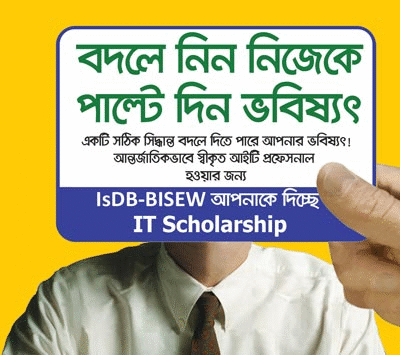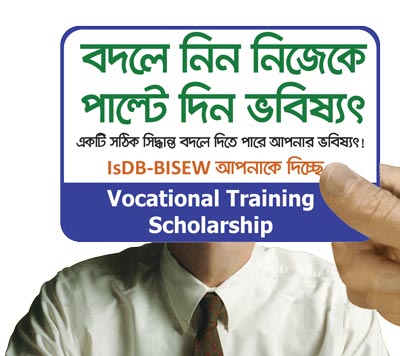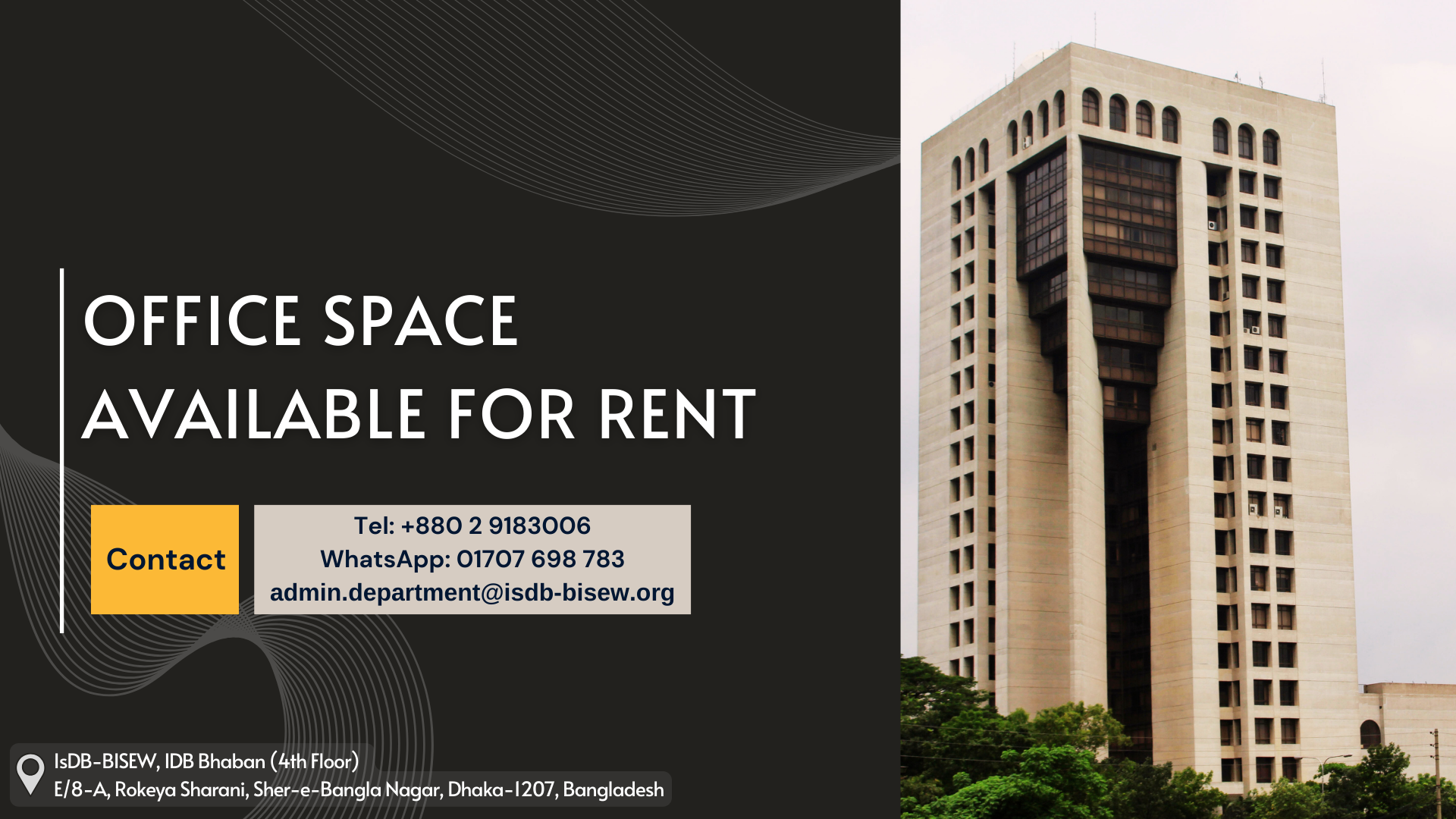Bi-monthly news update from IsDB-BISEW IT Scholarship Programme (January 2021)
Dec 20, 2020 / IT Scholarship ProgrammeEmpower

After a long gap in our publication due to the pandemic, we are back. Welcome to the January 2021 issue of Empower, a periodic newsletter of the IsDB-BISEW IT Scholarship Programme. This edition includes the following topics of note:
- New courses in the IT Scholarship Programme for polytechnic diploma holders
- My Experience in the IT Scholarship Programme – The sky is the limit
- Online training and assessment in the IT Scholarship Programme
New Courses in the IT Scholarship Programme for Holders of 4-year Polytechnic Diploma
IsDB-BISEW recently launched three new courses under the IT Scholarship Programme. The courses were introduced specially for the graduates of four-year polytechnic diploma holders coming from the following backgrounds:
- Computer Science/Computer Technology
- Electronic Engineering
- Telecommunication Engineering
A brief description of the new courses are given below:
Course: Cloud Computing Using Oracle Application Express
Many businesses have already switched their IT resources to the cloud because, according to them, this model delivers a more cost-effective and efficient way to serve their customers, partners, and suppliers. The biggest advantage provided by cloud computing is that it eliminates many of the complex constraints found in the traditional computing environment, including cost, space, time, and power.

Application Express (otherwise known as APEX) is a web application tightly coupled to an Oracle database. Oracle APEX applications are built on technology that resides within an Oracle Database, so all your applications can be easily run on any Oracle platform, from the Oracle Database Cloud Service to your in-house data centre to Oracle Database XE on your laptop. It has several uses:
- you can use its tools to query and modify the database
- you can use its tools to create your own web applications that interact with the database, and you can run the web applications created by you and others
Course Content
|
# |
Module |
Tools/Technologies |
|
1 |
Computer Fundamentals |
Internet & Office Productivity Applications |
|
2 |
Oracle Database 12c: SQL |
Oracle DB 12c Oracle Apex 20c |
|
3 |
Oracle Database: Program with PL/SQL |
|
|
4 |
Programming in HTML5 with JavaScript & CSS3 |
|
|
5 |
Oracle Application Express |
|
|
Course Duration = 460 Hours |
||
Skills Taught
Upon successfully completing the course, the trainees shall learn the following skills:
- Understand the APEX Builder and what it can do
- Basics of Report and Forms
- Security essentials
- Deploying application to new environments
- Extending declarative functionality with custom code
- Interactive grids
- Custom dynamic action
- The correct way of using HTML / CSS / JS in APEX
Areas of Employment
- Developer/Programmer in software development companies
- Full-stack developer in any organization
- Freelance developer
- Oracle Developer
- Database Engineer
Course: Modern Web Application Development using MVC, .NET Core & Angular
This course prepares the trainees to undertake a career as a full-stack web developer using the ASP.NET MVC5, ASP.NET Core & Angular tools and technologies.

Course Content
|
# |
Module |
Tools/Technologies |
|
1 |
Computer Fundamentals |
Internet & Office Productivity Applications |
|
2 |
Design and implement databases with MS SQL Server 2016 |
· SQL Server 2016 EE · Visual Studio 2019 · IIS · JavaScript, jQuery · HTML5 & CSS3 · Angular 6 · MVC 5 & CORE · REST Web API |
|
3 |
Programming with C# 7 and .Net 4.6.1 |
|
|
4 |
Programming in HTML5 with JavaScript & CSS3 |
|
|
5 |
Developing ASP.NET MVC 5 Web Applications & APIs |
|
|
6 |
Developing ASP.NET Core Web Applications & APIs |
|
|
7 |
Advanced Web Application Development with Angular |
|
|
Course Duration = 460 Hours |
||
Skills Taught
Upon successfully completing the course, the trainees shall learn the following skills:
- Creating web pages with HTML, designing with Bootstrap and interactivity with JavaScript
- Designing and creating web applications with ASP.NET MVC 5/ASP.NET CORE MVC and MS SQL database
- Designing and implementing web applications with the popular jQuery library
- Creating modular-based and component-based web application with Angular
Areas of Employment
- Developer/Programmer in software development companies
- Full-stack developer in any organization
- Freelance developer
- Testing engineer
My experience in the IT Scholarship Project

Name: MD. Farid Uddin
Trainee ID: 1172231
Round: 23
Course: Enterprise Systems Analysis & Design with C#.NET
Position: Software Engineer
Employer: Microsoft, Shanghai, China
The Sky is the Limit
With a master’s degree in Philosophy, MD. Farid Uddin seemed an unlikely candidate to have an IT career at Microsoft. But that is what actually happened. Farid Uddin is now a software engineer at Microsoft. His story is one of single-mindedness of purpose and excellence at work that leads to a life-changing outcome.
Farid Uddin’s father retired from government service when Farid was in class IX. Supporting a family of four children and a wife on a meagre government pension became very difficult for him. Farid had to give private tuitions to supplement the family income and bear his own cost of education.
After passing his HSC exams, Farid managed to get admission in the Department of Philosophy at Jagannath University. He did graduate successfully but Philosophy was never his cup of tea. Earlier on, Farid’s elder brother, a student of computer science, had drawn Farid’s attention to an opportunity that was open to graduates from almost any discipline. This was the IsDB-BISEW IT Scholarship Programme. This unique programme offered a yearlong diploma course on IT and placed its graduates in career-oriented employment in the IT industry. Farid had kept this in mind throughout his university studies.
Right after completing his master’s degree he applied for the IT Scholarship in Round-23 of the programme and was awarded the scholarship for the training course on Enterprise Systems Analysis and Design with C#.NET. The training was rigorous and the exams were tough. But Farid persisted and successfully completed the course in 2015. The Placement Cell of IsDB-BISEW secured a position for him as an intern in an IT Firm.
After his internship, Farid joined an IT firm as a Software Engineer and within a year and a half, he was drawing a salary of BDT 50,000 per month thus outshining most of his colleagues, many of whom were computer science graduates. This rapid rise gave his confidence a big boost and led him to apply for the position of Software Engineer at Microsoft. After clearing several exams and competing against applicants from different countries, Farid got the job at Microsoft for monthly salary BDT 200,000 and was posted at Shanghai in China. Microsoft also provided him with accommodation facilities.
Farid firmly believes that the IT Scholarship Programme was a turning point in his life. The training programme successfully converted a graduate from the arts background into a highly skilled IT professional. Like Farid, the IT Scholarship Programme has changed the lives of thousands of youths. According to Farid, the sky is the limit for anyone who takes this scholarship seriously enough.
Online training and assessment in the IT Scholarship Programme
Like all other education and training programmes in the country, the IT Scholarship Programme has also been adversely affected COVID-19 pandemic. Classes under the training programme were suspended from 16 March 2020 after government directive for closure of all educational institutions. However, with active assistance from the Programme Authority, the Project Consultant took the initiative of moving the IT Scholarship Programme online on a trial basis.
With the trainees dispersed all across the country, trainees were contacted individually and their situation assessed in terms of readiness for participating in online training. Trainees who were not equipped to start online classes were given time to collect the required hardware and get connected to the Internet. Course instructors were given guidelines on conducting online classes. They were specifically instructed to conduct online classes from the TSP lab. Eventually, online classes commenced on an experimental basis from the month of June 2020 and gradually an increasing number of batches started to join their courses.
Rural/Semi-urban location of trainees and connectivity
Internet connectivity is a primary requirement for online training. But around 50% of trainees in the IT Scholarship Programme were located in rural or semi-urban regions and were widely spread throughout the country. Some of the trainees in these areas did not have the required Internet connection, namely, fixed broadband connection. Lack of proper Internet connectivity is the biggest single hurdle for delivering online training. These particular trainees were advised by the course consultants to procure low-cost 4g modems which solved their connectivity problems to a great extent. Trainees who possessed smartphones were instructed to use mobile hotspot feature of their phones to connect their computers with the Internet when cable based Internet was not available.
Some of the trainees did not have the ideal environment at home or suffered from sub-optimal Internet connection within their homes for participating in online classes.
- For instance, one trainee travelled six kilometres from his home to a shop in the village marketplace for requisite Internet access on a daily basis;
- Another trainee attended his class sitting under a tree near his home in order to secure proper Internet bandwidth. Despite these hurdles the trainees were tremendously motivated and participated in the online training wholeheartedly.
Provisioning of courseware
The Training Service Providers (TSPs) provide hardcopy of the courseware (books and other printed materials) to the trainees before the start of each new module in the course. The TSPs were instructed to use courier service to dispatch required courseware to trainees who are located outside the metropolitan area. Trainees living within the city collected their courseware by visiting their respective TSPs.
Attendance Capturing
During in-person training, the trainees’ attendance used to be captured through automatic biometric fingerprint recording at TSP premises. The trainees’ fingerprint was then processed and inserted in the Project Information System (PIS) database. Since this method of attendance recording was out of scope in online settings, an effective alternative method was adopted.
All trainees were required to log into the online classes using their individual IDs in the Zoom software platform being used for online training. Zoom automatically generates a report comprising of class participants, their IDs and duration of trainees’ participation in the class at the end of each class. This automatically generated report was fed to the PIS which then processed the report and updated its attendance database for each class.
Quality assurance in online settings
The IT Scholarship Programme has been distinguished from other training initiatives by its high-quality delivery and learning outcomes. From the onset, the quality aspects of training delivery, learning and monitoring have been kept in mind while designing and implementing the online training system. The quality assurance objectives have been accomplished in the following manner:

- Course consultants’ full-time monitoring and supervision of training
Close monitoring of training has been a hallmark of the IT Scholarship Programme. The emphasis on monitoring of training by the course consultants has continued in the online training programme. All course consultants of the training programme were stationed at IsDB-BISEW premises for round the clock monitoring of online training. The consultants’ full-time online presence in the class ensured the instructor and trainees full compliance with the standards of teaching and learning practiced in the IT Scholarship Programme.
- Live interaction with online trainees and feedback
During online sessions the course consultants interacted with the trainees by asking them questions to gauge their understanding of the lesson being delivered. These interactions lessened the trainees’ sense of isolation in an online learning environment and increased their class participation while assisting both the consultant and the instructor to measure the effectiveness of lesson delivery.
- Assessment system for online training
Rigorous and recurring assessment of trainees is an integral part of training in the IT Scholarship Programme. To uphold the assessment regime the Project Consultant developed an online system that provides the means to take trainees’ exams with the same level of accuracy and effectiveness as was practiced in in-person scenario.
The online assessment system (OAS) has been developed specifically for the IT Scholarship Programme and has been designed to address all its assessment needs including:
-
- Conducting mid-term and monthly exams in MCQ and Descriptive formats
- Facilitating Evidence (Practical) exams and its records
- User role management
- Question bank management
- Exam management and monitoring
- Automated scoring of MCQ sections
- Archiving of examination scripts for record-keeping
- Reporting and record-keeping of exam results, etc.
The security and conformance features of the OAS include the following features:
-
- Password protected access to the system
- Automated shuffling of exam questions so that no two trainees get the same set of questions
- Automated correspondence between questions and competency units
- Detection of a trainee’s effort to take screen-shot of exam script. In such a case, the trainee’s exam is automatically cancelled and the course consultant is notified of the event
In addition to the above, the trainees are kept under video surveillance during the exam.
In-person Training
Some of the trainees who were residing in the metropolitan area or could relocate themselves to Dhaka were able to start in-person classes at their TSPs from the month of August 2020. All training centres gradually were able to switch to in-person training from October 2020.



